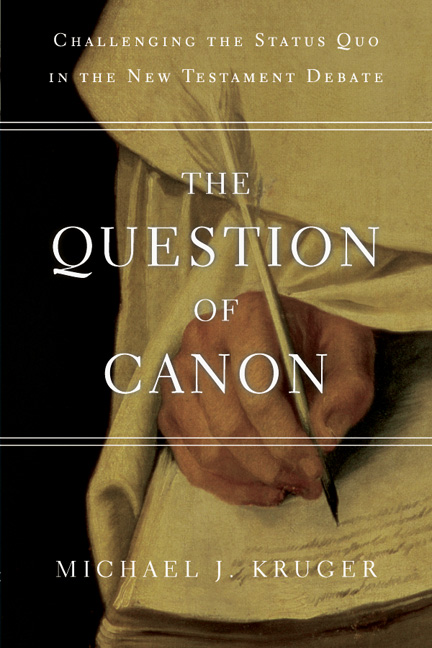Michael Kruger: The Question of Canon
 Michael J. Kruger, The Question of Canon: Challenging the Status Quo in the New Testament Debate (Downers Grove: IVP Academic, 2013), 256 pages.
Michael J. Kruger, The Question of Canon: Challenging the Status Quo in the New Testament Debate (Downers Grove: IVP Academic, 2013), 256 pages.
Despite the fact that the contours of the Christian canon were decided by the fourth century, vibrant and vigorous discussion about the authenticity of the books has persisted into our day. Indeed, for many years now, the New Testament canon has been a subject of research and dispute. When and how these 27 books became recognized as a new scriptural deposit has been a chief source of contention. More importantly, why did the new Christian sect perceive the need for a new canon at all? Does the New Testament exist because of some action done in the second or third century church, or did it arise more naturally from within the early Christian faith itself? Was it an extrinsic phenomenon, or an intrinsic one? Were the books written as Scripture, or did they become Scripture by a decision of the second-century church? These are the types of questions that led Michael J. Kruger to challenge modern scholarship’s dominant view that the New Testament is a late creation of the church imposed on books which were originally written for another purpose.

Michael J. Kruger is President and Samuel C. Patterson Professor of New Testament and Early Christianity at Reformed Theological Seminary Charlotte.
Calling into question the commonly held extrinsic (or “from without”) view, which holds that the New Testament was an ecclesial product designed for ecclesial needs in the later Church, most directly to address the rise of Marcionism in the early church, Kruger tackles the five most prevalent objections to the classic understanding of a quickly emerging, self-authenticating collection of authoritative scriptures – he refers to his model as an “intrinsic” one. This framework recognizes the canon as the product of internal dynamics evolving out of the historical situation in which Christianity found itself, not a development retroactively imposed by the church upon books written hundreds of years before. He argues that the makeup of first-century Christianity created a favorable environment for the growth of a new revelational deposit. Kruger stipulates that the extrinsic model is correct as far as it goes, but that we should not rule out other definitions that bring more balance to our understanding of canon, and that therefore there is no sharp delineation between “Scripture” and “canon,” the latter of which only applies to the final, closed list of books. Moreover, he argues that there was a matrix of theological beliefs held by early Christians that would have resulted in a canon developing quite naturally, even if the early church did not recognize it formally. Third, he argues that while most Christians were illiterate, they were nonetheless characterized by a robust textuality – that is, the knowledge, use, and appreciation of written texts. Furthermore, he asserts that the New Testament authors, contrary to the interpretation of the extrinsic model, provide substantial indications that they understood their message as authoritative, showing this often quite plainly. If the extrinsic model were true, Kruger contends, we would expect that it would have taken quite a while for the New Testament writings to be attain Scriptural status, but in fact the Scriptures were deemed to be such at a much earlier time than commonly allowed by scholars.
While The Question of Canon scrutinizes today’s popular scholastic view, it also offers an alternative concept that is, in some respects, a better empirical foundation for canonical studies. He does not deal with the standard questions about the canon. For example, how do we know we have the right book? Instead, he asks more fundamental questions about where the canon comes from. I recommend this text to those who have interests in knowing how, when, and why the Scriptures became “the Scriptures.” Kruger has offered the church a service with this volume.
Reviewed by Bradford McCall
Publisher’s page: http://www.ivpress.com/cgi-ivpress/book.pl/code=4031
Companion website: http://michaeljkruger.com/tag/the-question-of-canon/
Preview The Question of Canon: https://books.google.com/books/about/The_Question_of_Canon.html?id=eYgMAgAAQBAJ
Category: Biblical Studies, Summer 2016


